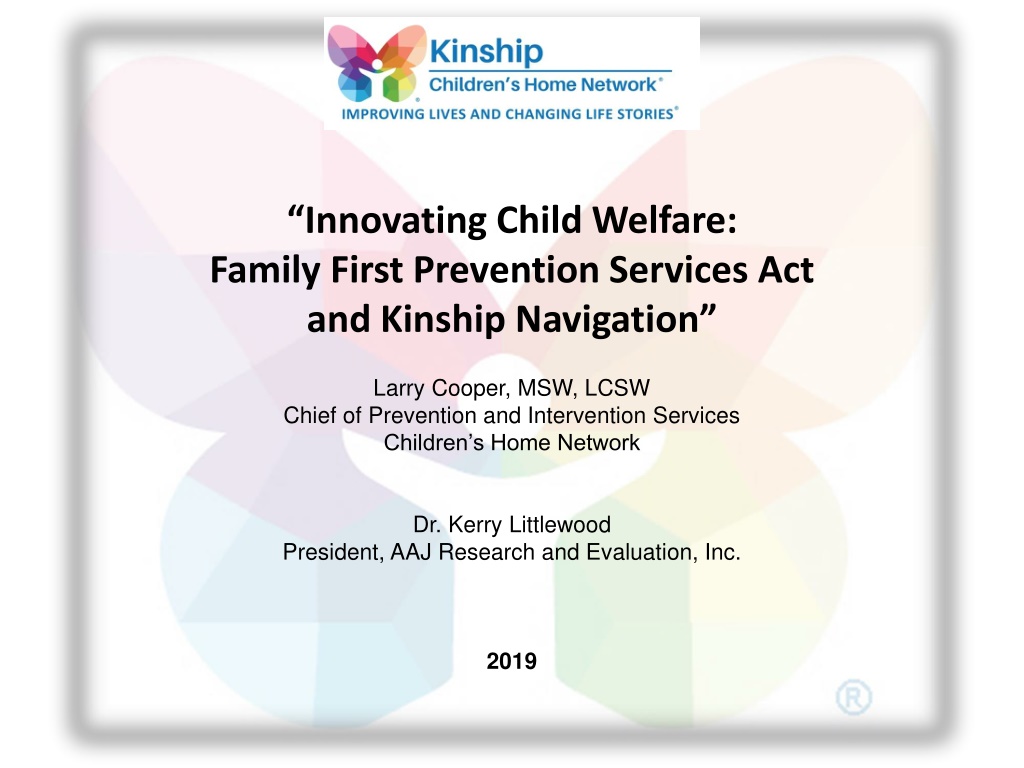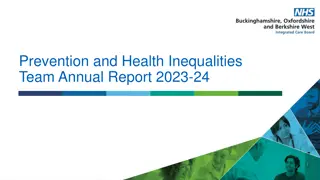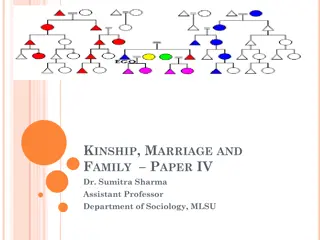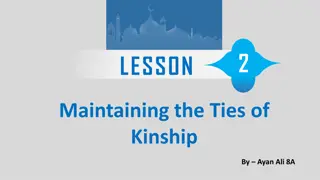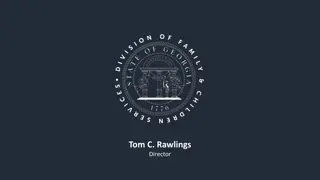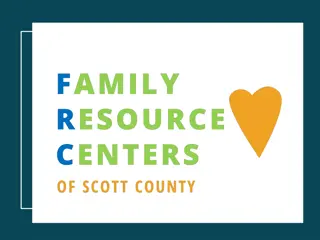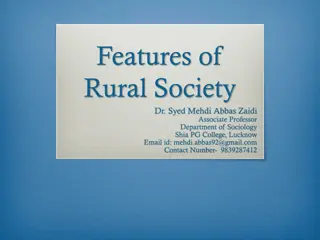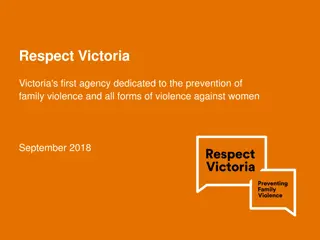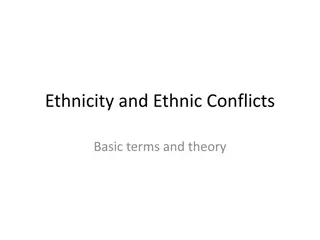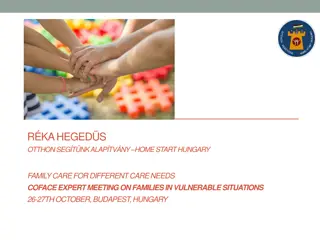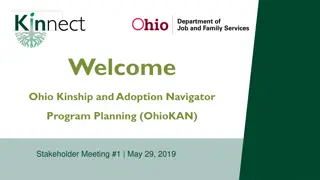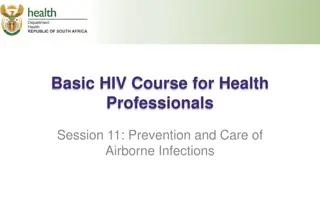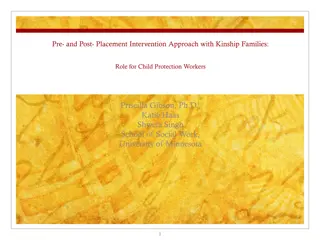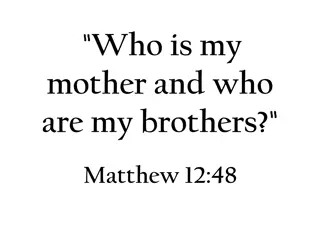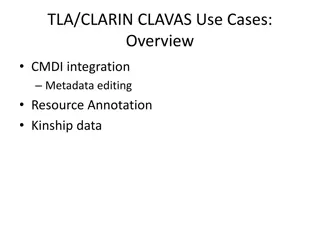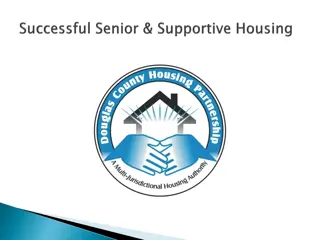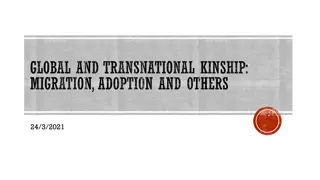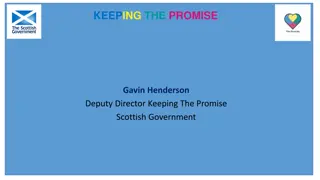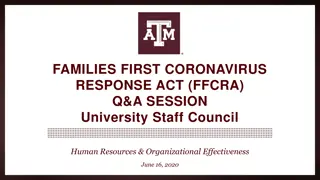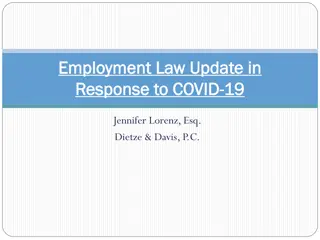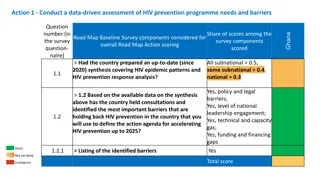Empowering Families: Family First Prevention Act and Kinship Care
Exploring the innovative approaches of the Family First Prevention Services Act and Kinship Navigation, this presentation discusses the importance of prevention services, building community support for kinship care, implementing Kinship Navigator programs, and the implications and future directions in child welfare. It emphasizes the shift towards investing in evidence-based programs, reducing over-reliance on group care, and supporting children's well-being within families.
Download Presentation

Please find below an Image/Link to download the presentation.
The content on the website is provided AS IS for your information and personal use only. It may not be sold, licensed, or shared on other websites without obtaining consent from the author. Download presentation by click this link. If you encounter any issues during the download, it is possible that the publisher has removed the file from their server.
E N D
Presentation Transcript
Innovating Child Welfare: Family First Prevention Services Act and Kinship Navigation Larry Cooper, MSW, LCSW Chief of Prevention and Intervention Services Children s Home Network Dr. Kerry Littlewood President, AAJ Research and Evaluation, Inc. 2019
Presentation Objectives A. What we know about Family First Prevention Services Act and Kinship Care B. Building a community Kinship Navigation model to support relative placement C. Implementation of Kinship Navigator D. Practice implication E. Future directions 2
A. What we know about Family First Prevention Services Act On Feb. 9, President Donald Trump signed the Bipartisan Budget Act of 2018 (H.R. 1892) Full bill H.R. 1892 available at congress.gov Huge Step forward for relative caregivers! 3
Themes of the Family First Act PREVENTION is important Previously majority of federal child welfare $ available only after child in foster care- For $7 (child welfare) there was $1(prevention) Children do best in FAMILIES REDUCE OVER-RELIANCE ON GROUP CARE- should be short term, quality, treatment- oriented Investments in EVIDENCE-BASED PROGRAMS- Federal funds for proven approaches 4
Family First Act Kinship Navigator Programs As of October 1, 2018, states can receive federal reimbursement for up to 50% of their expenditures to provide kinship navigator programs that meet evidence- based requirements of promising, supported or well- supported practices Children not required to meet Title IV-E income eligibility requirements 5
A. What we know about Kinship care Kinship care is the full time care, nurturing and protection of children by relatives, members of their tribes or clans, Godparents, Stepparents, or any adult who has a kinship bond with a child This definition is designed to be inclusive and respectful of cultural values and ties of affection. It allows a child to grow into adulthood in a family environment Child Welfare League of America 6
Why do we want to talk about it? Family First Prevention Services Act (FFPSA)- Federally reimbursable Kinship Navigation services if implementing an evidenced based approach. Approximately 7.6 million children live with a relative who is the head of the household in the U.S. 2.6 million children are being raised by a relative and do not have a bio-parent in the household nationwide Over 130,000 children in out-of-home care live with relatives For every child in foster care living with a relative there are 20 being raised by a relative caregiver outside of the foster care system nationwide 2,572,146 million are Grandparents raising grandchildren Kinship care is the fastest growing type of out-of-home placement 7
STATISTICS FORMAL CARE: The Adoption and Foster Care Analysis and Reporting System (AFCARS) 2015 (National Numbers) Number of children in foster care: 427,910 (sept 30, 2015) - Relative Foster Home: 127,821 (30% of total) Children entering care (N=269,509) Reason for entering: - Drug Abuse Parent: 85,937 (32% of N) AFCARS 2016 (National Numbers) Number of children in foster care: 437,465 (sept 30, 2016) - Relative Foster Home: 139,017 (32% of total) Children entering care (N=273,539) Reason for entering: - Drug Abuse Parent: 92,107 (34% of N) 8
B. Key Elements of Kin Navigator Must be based on a kinship navigator model that meets evidence-based requirements of well-supported, supported, or promising practices, and that model must be included in a new federal Clearinghouse. kinship navigator models must considered for inclusion through an approval process from Abt Associates for the Prevention Services Clearinghouse: https://preventionservices.abtsites.com/ Must be coordinated with other State or local agencies that promote service coordination or provide information and referral services, including the entities that provide 2 1 1 or 3 1 1 information systems where available, to avoid duplication or fragmentation of services to kinship care families. Must be planned and operated in consultation with kinship caregivers and organizations representing them, youth raised by kinship caregivers, relevant government agencies, and relevant community-based or faith-based organizations. 9
B. CONTD Must establish information and referral systems that link (via toll- free access) kinship caregivers, kinship support group facilitators, and kinship service providers: to each other; eligibility and enrollment information for Federal, State, and local benefits; relevant training to assist kinship caregivers in caregiving and in obtaining benefits and services; and relevant legal assistance and help in obtaining legal services. Must provide outreach to kinship care families, including by establishing, distributing, and updating a kinship care website, or other relevant guides or outreach materials. 10
B. CONTD Must promote partnerships between public and private agencies, including schools, community based or faith-based organizations, and relevant government agencies, to increase their knowledge of the needs of kinship care families to promote better services for those families. Under federal law, these programs may also establish and support a kinship care ombudsman with authority to intervene and help kinship caregivers access services; and support any other activities designed to assist kinship caregivers in obtaining benefits and services to improve their caregiving. 11
Why is Kinship Care Preferable? Children live with people they know and trust Kinship care supports family preservation Children keep their family identity Lessens the feeling of separation and loss Kinship is strength based, not limitation based Kinship care supports community and culture Child Welfare League of America 12
Why Kinship Care is Needed Children may be unable to live with their parents because of: Parental substance abuse Death of a child's parent Incarceration Domestic violence Mental health issues Parental abandonment Child neglect or abuse Teenager not ready to be a parent 13
Numbers - Locally 361,006 Florida Grandchildren living with their own Grandparents. 151,683 Grandparents responsible for their own Grandchildren without a parent in the household Source: U.S. Census Bureau, 2013-2017 American Community Survey 5-Year Estimates Formal Foster Care System (as of 6/30/2019) Total 23,476 9,974 Children in out-of-home care (OHC) with relatives 3,132 Children in OHC with non-relatives 7,227 Children in Licensed Foster Care 1,913 Children in Residential Group Care Source: https://www.myflfamilies.com/programs/childwelfare/dashboard/c-in-ooh.shtml Florida ranks 3rd in the number of Grandparents and other relatives raising children in the United States DCF has a 65% target for OHC population in relative/non-relative care 14
Different Types of Kinship Arrangements Arrangements made by family all by themselves Informal Some involvement with the system but family steps up Voluntary Placement made through the Court Formal 15
Primary Needs Identified by Caregivers Based on the USF Kinship Needs Survey: Child Care Financial Support Medical Care Educational Assistance for Children Counseling for Children Support Group(s) for Caregivers Legal Assistance Information about Program and Services 16
Public Assistance for Relative Caregivers Nationally Only 12% of kinship families receive TANF (child-only) cash assistance, even though nearly 100% of children are eligible, Only 42% of kin households receive SNAP (food stamps) assistance, Only 42% of children receive Medicaid for the children in kin care Only 17% of working kin caregivers receive Child Care assistance Only 15% of low income kin caregivers receive public housing assistance 17
Public Benefits in Florida $242-$298 per child $242-$298 per child Relative Caregiver (RCG) and Non-Relative Subsidy Funds for dependency cases once adjudicated Proposed Guardianship Assistance Program (GAP) Effective July 2019 Effective July 2019 Relative Caregiver (RCG) and Non-Relative Subsidy Funds for dependency cases once adjudicated Proposed Guardianship Assistance Program (GAP) $333 (licensed as Level 1 Foster Home) Foster Home) $333 (licensed as Level 1 18
CHN Kinship Navigation Program Currently serving: Hillsborough Pinellas Pasco Osceola Orange Seminole DCF contracting with CHN to expand as part of the new Federal Omnibus Funding for 2018- 2019 Hillsborough Manatee Sarasota Desoto Miami-Dade 19
Key Navigator Components The CHN KIN-Navigator program integrated the kinship support model with three unique innovations: 1) One-e-App 2) Peer-to-Peer Navigation 3) Interdisciplinary Team 20
One e - app Kin caregivers gain hands-on assistance by Kin Navigators to apply for public assistance via: DCF ACCESS online portal Applying for cash assistance, food stamps, Medicaid Kin Navigator links with local DCF ACCESS Community Liaison to troubleshoot DCF ACCESS Customer Call Center 8am to 5pm Mon-Fri 1-866-762-2237 21
C. Peer-to-Peer Kin Navigators Peer-to-Peer Kin Navigators who have varying levels of education and experience in helping others, which has highlighted the importance of using peers because they have close ties to the communities they serve. Tena Randecker (Great Aunt-Kin caregiver) 2017 CHN Employee of the Year Participated in Washington DC in Congressional Foster Youth Caucus Panel and Roundtable Discussion on Kinship Navigator Programs in May 2018 Kin Navigator since 2012 Paula Davis (Grandmother-Kin caregiver) Kin Navigator since 2015 Participating in LEAD grant to promote Self Care Goals for caregivers Featured on ABC Action News on July 25, 2018 https://youtu.be/cRTVb3a7CgE 22
Inter-Disciplinary Team (IDT) Kin Navigators and Kin Caregivers gain access to subject matter specialists that may include: Substance Abuse Behavioral Support/Mental Health Legal School Child Welfare ACCESS (public benefits) 23
D. Practice Implications Kin Navigator Results Kinship Navigator-Children s Home Network (CHN) has conducted one of the largest and only randomized control trials for a kinship navigator program in the country, Compared with peer-to-peer support, formal care, and usual foster care supports, the CHN s Kinship Navigator- program showed significantly higher self-report scores in arenas related to caring for their placed child such as: Increased access to public benefits Increased placement stability at 12, 24 and 36 months At the 12-month follow-up period, kinship caregivers enrolled in Kinship Navigator-scoredhigher with significant increases in Family Functioning, Social Supports, Concrete Supports, Child Development, and Nurturing & Attachment Kinship Caregivers enrolled in Kinship Navigation services had higher scores in protective factors at the 12-month follow-up period Peer-to-Peer Only group were Grandparents raising Grandchildren who had varying levels of education and experience in helping others, which has highlighted the importance of using peers because they have close ties to the communities they serve 24
E. Future Directions Federal Law-Family First Prevention Services Act The Family First Prevention Services Act (FFPSA) within Division E, Title VII of the Bipartisan Budget Act of 2018, amended title IV-E of the Social Security Act to allow title IV-E agencies the option to receive title IV-E funding for Kinship Navigator programs that meet certain criteria, including operating in accordance with promising, supported or well-supported practices Florida Law- HB 1079 (passed in 2018) DCF to establish and operate a Guardianship Assistance Program by July 2019 to provide guardianship assistance payments to certain guardians beginning on a specified date; providing definitions; providing eligibility requirements; authorizing guardians to receive such payments for certain siblings; requiring the department to annually re-determine eligibility; 25
Resources Children s Home Network Kinship Services: 888-920-8761 Contact your local Foster Care/ Child Welfare organization to learn about Relative Caregiver/Non-Relative supports Contact your local Foster Parent Association Generations United (National Center on Grandfamilies) at www.gu.org Florida Law Help website http://floridalawhelp.org/ Child Welfare Information Gateway https://www.childwelfare.gov/topics/outofhome/kinship/locating/relationships/ Brookdale Foundation- National Relatives as Parents Program http://www.brookdalefoundation.net/index.html 26
Articles Littlewood, K. (2015). Kinship Services Network Program: Five year evaluation of family support and case management for informal kinship families. Children and Youth Services Review, 52, 184-191. Retrieved at: http://dx.doi.org/10.1016/j.childyouth.2014.10.008 CHI CW/TANF Kinship Interdisciplinary Navigation Technologically - Advanced Model (KIN- Tech): Final Evaluation Report. Final Evaluation Report Period: 9-30- 2012 to 6-30-2016. https://library.childwelfare.gov/cbgrants/ws/library/docs/cb_grants/Record?rpp =25&upp=0&w=NATIVE%28%27grant_state+%3D+%27%27FL%27%27%27%29& m=64 National Conference of State Legislatures- Article on Family First Prevention Services Act http://www.ncsl.org/research/human-services/family-first-prevention- services-act-ffpsa.aspx 27 27
QUESTIONS 28
For Further Information Larry Cooper, MSW, LCSW Chief of Prevention and Intervention Services lcooper@childrenshomenetwork.org 813-901-3423 https://mykinship.org www.childrenshomenetwork.org 29
